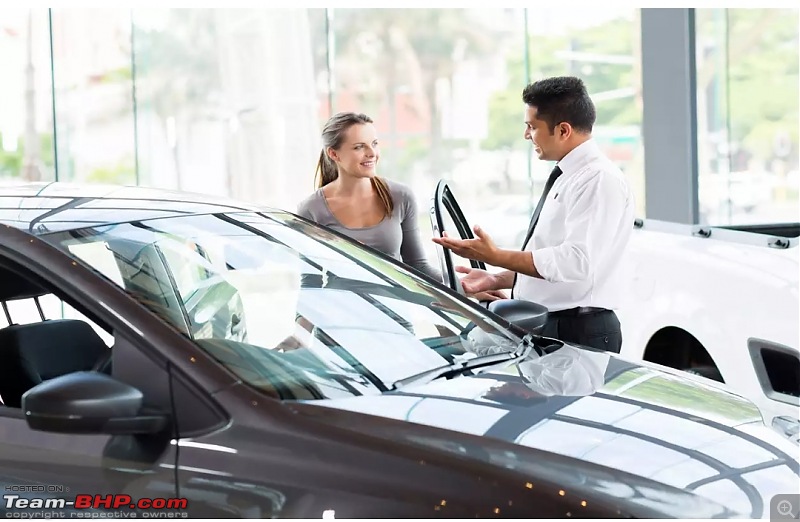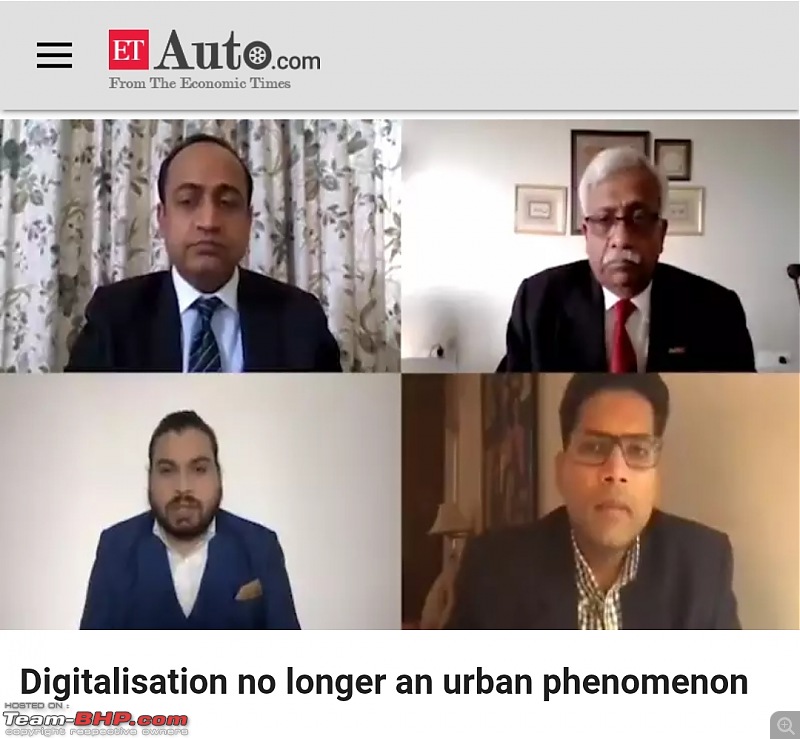| |||||||
| Search Forums |
| Advanced Search |
| Go to Page... |
 |
| Search this Thread |  1,409 views |
| | #1 | ||||
| BHPian Join Date: Aug 2018 Location: 》
Posts: 477
Thanked: 2,235 Times
| Are dealers equipped enough to adapt to the changing paradigms of car sales? Are dealers equipped enough to adapt to the changing paradigms of car sales ?  All the five steps of a customer purchase
Sharing the prime excerpts of a good read. Full Article here - ETAuto. Industry experts at the digital ETAuto Retail Forum discussed how the journey will be going forward with customers’ evolving nature. What is the future of physical retail, and what will it take to make all the boxes ticked.  People assume that most of the digital activities are coming through big cities, and it is the tech-savvy youngsters who are doing it, but that’s no longer true. It is spreading at a much faster pace and across much wider geographies. Quote:
Sanghi who is based in Alwar, Rajasthan, outlined that 90% of his customers are rural and agri-based. They won’t even imagine touching a computer for inquiring; mobile has come to their aid. Nikhil Bansal, industry head-automotive, Google India, said that the rural consumers, who contributed less than 50% of the online queries, today have surpassed urban users in terms of internet adoption. Bansal said it is not just pent-up demand but actually a structural change that is coming. Demand is here to stay, and 2021 is the year of the auto. So in such a scenario the main task according to Goel for all marketeers, carmakers and dealers is to be able to recognise this change and figure out how the traditional brick-and-mortar model and digital are complementing each other to be able to take care of the customers because ultimately ‘customer is the king’. Evolving nature of customers The customer is much better informed than most sales consultants, and the whole purchasing process for customers is more about the experience now, Sanghi said. The customer is coming to the dealership to validate the information that he/she has got from the internet, and the dealers’ job is to aid the journey in validation. Queries for the auto industry have grown by 45% despite the slowdown and the lockdown in 2020.Nikhil Bansal, Google India Quote:
Dealers need to up the ante According to a Google study, almost six out of ten people who are purchasing a two-wheeler or four-wheeler are very comfortable taking the entire process online. But the main task at hand here is to make that process seamless and for that, there needs to be a change in the mindset of dealers as well. If dealers are going digital, it is important that the workforce is not only aware of what digital is; they also have the right tools, right knowledge and the right mindset to be in the digital world. The dealers need to realise that the expectation of the customer when he comes online is extremely high. He expects an answer almost immediately and will not want to wait for a second. “I think it is important for dealerships and its entire team to realise that an inquiry needs to be responded in less than five minutes after it is received. If not, that inquiry will be lost either to the competition or the customer would change his mind. So you’ll have to be live online all the time,” Sanghi said. Additionally, the dealers need to devise their marketing strategies rather than relying entirely on the OEMs. There is an added responsibility to build websites, Facebook pages and WhatsApp tools to enhance customer engagement. Small dealer outlet is the way forward Most of the OEMs have already realised that smaller physical dealer outlets are the way forward in order to stay competitive and relevant. There is no need for ‘Taj Mahal’ size dealerships anymore because most of the customer purchase journey would have already concluded online. Sanghi pointed out that there is no need for such a huge infrastructure anymore; they will have to become lean. Quote:
Honda Cars have a concept of extended outlets, i.e. a much smaller outlet, a spoke/hub of a much bigger outlet where the customers can see the car, experience it, and decide. Going forward the focus will be more on these extended outlets rather than bigger dealerships in order to become more viable and complement the digital integration, Goel said. In a way, digital is only going to complement the physical dealerships. Another important highlight of the discussion was ‘To sell to demand’ “To sell to demand enables cutting down cost and conserving it. When you are not selling to demand, it means you are keeping inventory. Need to focus on after-sales After-sales has always been a neglected domain these widely held discussions which need to be brought to the forefront according to the industry experts as dealers derive most of their profitability from after-sales services rather than selling the car. Quote:
Full Article- ETAuto These are interesting aspects of the huge structural and behavioural changes happening on the Indian car scene. Would love to hear more on this from our TBHP experts and esteemed enthusiasts. How much change in dealer engagement does the customer find on ground zero? Are the dealers adapting fast enough? Who are the trend setters reaping first- movers advantage? Who are the slow couches sliding into oblivion? Last edited by JS Kwt : 23rd January 2021 at 15:31. | ||||
| |  (8)
Thanks (8)
Thanks
 |
| The following 8 BHPians Thank JS Kwt for this useful post: | anandhsub, DrANTO, drrajasaravanan, EightSix, GTO, JTM, Shrayus_shirali, warrioraks |
| |
| | #2 |
| Senior - BHPian Join Date: Oct 2020 Location: Magic land
Posts: 1,057
Thanked: 4,415 Times
| Re: Are dealers equipped enough to adapt to the changing paradigms of car sales? In terms of consumers(urban & rural) familiar with online mediums, most of them already know inside and outside of the car by means of online configurator. Why are we at the dealer then ? To see the thing in flesh, experience it (drive and sit in) and to discuss the negotiate. The things I hope to see from the sales team : 1. Clean and neat cars in the showroom. 2. Test drives car should again be available even if later. 3. Cut the bullshit. Like how a certain Indian car is same as the range rover, and all such big stories. 4. Word for word by heart explanation. I have seen some folk use the fancy touchscreens and tabs and read it to us. Feels like School recitals at times.  But the most important of all is after sales. The whole service center experience and getting that right. Sometimes it can feel like a sweatshop. Rude behavior, trying to pour things down our throat, especially things we didn't ask for while handing over the car for service etc. Gone are the days of how the showrooms affects our buying decision. Yes, there should be a minimum level of professionalism, but after sales stories are what buys our confidence. |
| |  (2)
Thanks (2)
Thanks
 |
| The following 2 BHPians Thank TrackDay for this useful post: | EightSix, JTM |
| | #3 |
| Senior - BHPian Join Date: Jan 2010 Location: TSTN
Posts: 6,237
Thanked: 9,647 Times
| Re: Are dealers equipped enough to adapt to the changing paradigms of car sales? Dealer equipped or not eh? Let me share a reality of my cousin. He completed MBA in digital marketing & has been employed by a company selling trucks. Now, he's supposed to be the one who's in touchbase with manufacturer & dealer. His actual line of work is to ease out & support the dealer in terms of deliveries of truck from manufacturer. Dealer is ready to sell the truck, provided, my cousin (and many others) have to find lead, do all the necessary digital & paper work for the dealer, ensure the consignment from manufacturer arrives on time & many other unsaid (and unspeakable) day to day operations. So basically, the dealer is ready to sell & deliver the truck to the customer & all in between has to be done by these young graduates, which, ideally is, supposed to be done by the dealer. The dealers simply don't want to do because they don't want to make new hires with digital knowledge & hence these graduates have to work for both the truck company & dealer both. Manufacturer don't want to interfere with these digital marketers simply because they don't want to be at the receiving end of the dealer. Oh!! BTW, all these MBA guys are qualified from top notch business school from DL & are employed at tier 2 or tier 3 towns & it easily takes 8+ years for one to get a tier 1 or a metro. |
| |  (1)
Thanks (1)
Thanks
 |
| The following BHPian Thanks aargee for this useful post: | JayKis |
 |

